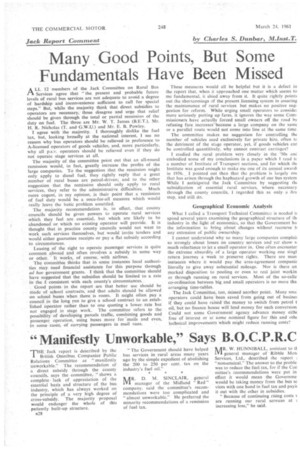Jack Report Comment by Charles S. Dunbar, M.Inst.T.
Page 62

If you've noticed an error in this article please click here to report it so we can fix it.
Many Good Points, But Some Fundamentals Have Been Missed
ALL 12 members of the Jack Committee on Rural Bus Services agree that "the present and probable future levels of rural bus services are not adequate to avoid a degree of hardship and inconvenience sufficient to call for special steps." But, while the majority think that direct subsidies to operators are necessary, • three disagree and urge that relief should be given through the total or partial remission of the duty on fuel. The three are Mr. W. T. James (B.E.T.), Mr. H. R. Nicholas (T. and G.W.U.) and Mr. E. B. Powley.
I agree with the majority. I thoroughly dislike the fuel tax, but, looking broadly at the national interest, I see no reason why bus operators should be relieved in preference to A-licensed operators of goods vehicles, and, more particularly, why all p.s.v. operators should be relieved even if they do not operate stage services at all.
The majority of the committee point out that an all-round remission would, in fact, greatly increase the profits of the large companies. To the suggestion that the remission might only apply to diesel fuel, they rightly reply that a great number of rural buses are petrol-driven; and to the other suggestion that the remission should only apply to rural services, they refer to the administrative difficulties. Much more cogent, in my opinion, is their point that a remission of fuel duty would be a once-for-all measure which would really leave the basic problem unsettled.
The majority recommendation is, in effect, that county councils should be given powers to operate rural services which they feel are essential, but which are likely to be abandoned or which no existing operator will provide. It is thought that in practice county councils would not want to work such services themselves, but would invite tenders and would either guarantee receipts or pay a flat subsidy according to circumstances.
Leasing of the right to operate passenger services is quite common abroad and often involves a subsidy in some way or other. It works, of course, with airlines.
The committee thinks that in some instances local authorities may need financial assistance for this purpose through ad hoe government grants. I think that the committee should have suggested that the subsidies should be limited to a rate in the £ consistent with each county's circumstances.
Good points in the report are that better use should be made of school contracts, and that adults should be allowed on school buses .When there is room. It might often pay a • council in the long run to give a school contract to an established operator rather than to one quoting a lower, rate but not engaged in stage work. The committee refers to the possibility of developing parcels traffic, combining goods and passenger operation, using buses more for 'mails and even, in some cases, of carrying passengers in mail vans.
These measures would all be helpful but it is a defect in the report that, when it approached one matter which seems to me fundamental, it shied away from it. It quite rightly points out the shortcomings of the present licensing system in assuring the maintenance of rural services but makes no positive suggestion for reform. While urging small operators to considei more seriously putting up fares, it ignores the way some Commissioners have actually forced small owners off the road by refusing fare increases because a large company on the same or a parallel route would not come into line at the same time.
The committee makes no suggestion for controlling the number of vehicles used exclusively for private hire, often tc the detriment of the stage operator, yet, if goods vehicles can be controlled quantitively, why cannot contract carriages?
I studied the rural problem very closely in the '50s anC embodied some of my conclusions in a parer which I read tc a number of Institute of Transport sections, and for which tin Institute was good enough to make me one of its annual award' in 1956. I pointed out then that the problem is largely on that has arisen through the haphazard growth of our bus system While I anticipated the Jack Committee by suggesting Eh( subsidization of essential rural services, where necessary through the county councils, I regarded this as only. a .firs step, and still do.
Geographical Economic Analysis What I called a Transport Technical Committez is needed t( spend several years examining the geographical structure of thi
industry in the light of economics, so that the Government ha the information to bring about changes without recourse t( any extension of public ownership.
I cannot understand why so many large companies complait so strongly about losses on country services and yet show si much reluctance to let a small operator in. One often encounter the extreme absurdity of a large operator working one singl return journey a week to preserve rights. There are man instances where it would pay the area-agreement eompanie literally to give away substantial mileage. Nor is there an marked disposition to pooling or even to real joint workin or through running on rural services. Most of the so-calle co-ordination between big and small operators is no more tha arranging time-tables.
The Jack Committee, too, missed another point. Many sma operators could have been saved from going out of busine.5_ if they could have raised the money to switch from petrol t oil, but no finance house will lend money for such conversion, Could not some Government agency advance money eith( free of interest or at some nominal figure for this and oth( technical improvements which might reduce running costs?




































































































































